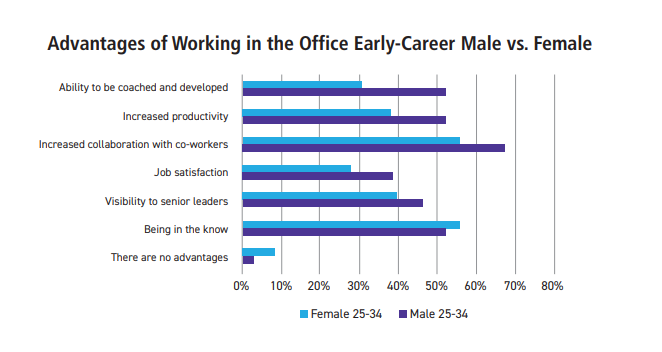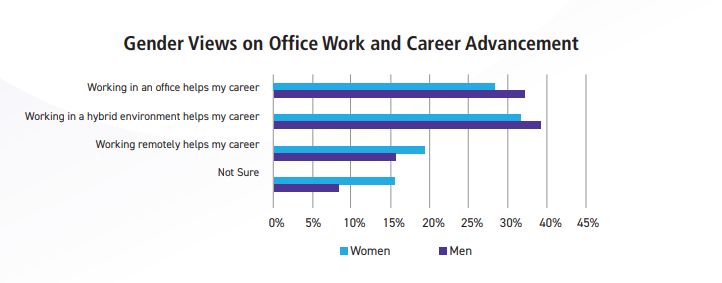
'The office tends to be an inherently male playing field, more palatable to men and therefore favouring their success'

Early-career women and men view office culture and experiences very differently, according to a new report, with many more young men than women saying that working from the office offers them increased productivity, career development and visibility to superiors.
The report, from the American Management Association (AMA), surveyed 1,000 U.S. knowledge workers about the impact of hybrid and remote work.
"Given the broad advantages cited by early-career men in the workplace, the most likely conclusion is that the office tends to be an inherently male playing field, more palatable to men and therefore favouring their success," read the report.
Whether through unconscious microaggressions, unconscious bias, or overt discrimination, male-dominated office cultures can contribute to women being excluded from valuable networking opportunities, says Carmina Ravanera, Senior Research Associate at the Institute for Gender and the Economy at the University of Toronto’s Rotman School of Management.
Exclusion takes many forms, including networking events after hours or on weekends that are inaccessible for women for reasons such as childcare or elder care responsibilities, or simple discomfort around male-centric activities.

Even meetings where males have been documented as talking over their female colleagues and taking credit for ideas leads to women not wanting to participate at all, she says.
The AMA survey found that 67 percent of men found working in the office increased collaboration with co-workers, compared to 56 percent of women.
“Even if they stay in-office, they are not able to not work the same way as men are, because men often have much easier networking opportunities if men make up the majority of leadership,” says Ravanera, “because people tend to be drawn to people who are like them, and that's partly why we have a lot of male-dominated leadership in workplaces.”
In addition to male-dominated work culture and issues of exclusion arising from unconscious bias, women are also choosing hybrid and remote working models because of the flexibility it offers.
“Women generally tend to benefit the most from flexibility in the workplace,” says Ravanera.
“Remote work is part of that, or even hybrid work, because of gender norms that mean women tend to be the ones taking care of children, or if they have other dependants like elderly parents or they have a family member with a disability, that care often falls to women, so flexible work can be really beneficial for them. And that is another huge reason why women tend to prefer remote or hybrid work situations versus having to go into the office.”

This also speaks to the idea of the “ideal worker”, Ravanera says, which is when society tends to label individuals who can work standard nine-to-five schedules, plus overtime.
“[It] basically assumes that they have no other responsibilities or people to take care of … They don't need flexibility. And that tends to really harm women, who have those needs for flexible work because we do still have these gender norms where women are often the ones being caregivers at home.”
Men also benefit from flexible work, she says, but that even after the pandemic, it is still normalized that if someone is working in the office, they are better workers than those working remotely.
The report also found that women who are choosing to remain remote because of the flexibility it offers may be missing out on important career advancements.
“The office may be acting as a springboard for young men, helping them advance more quickly,” the report states, adding that this could be adding to the documented “broken rung” effect where young women are not selected for critical early-career promotion from entry level to management.
Creating opportunities for networking and advancement for remote workers can help to counterbalance the opportunities lost by not being in-office, Ravanera says. This can also mean involving men in leading inclusion initiatives for remote and hybrid workers, and in leading conversations.
“I think it's important to spread awareness of what an inclusive versus non-inclusive work culture looks like. And I think in many cases, a lot of men would want to help out with that, and want to make their workplace more inclusive for everyone involved, and sometimes just might need to know ‘How can I best do that?” says Ravanera.
“I definitely think everyone has a role to play in making a more inclusive work culture, not just women themselves trying to advocate for themselves, but everyone in the workplace should be contributing to making it a place where everyone can thrive, everyone can be their most productive and their best selves.”